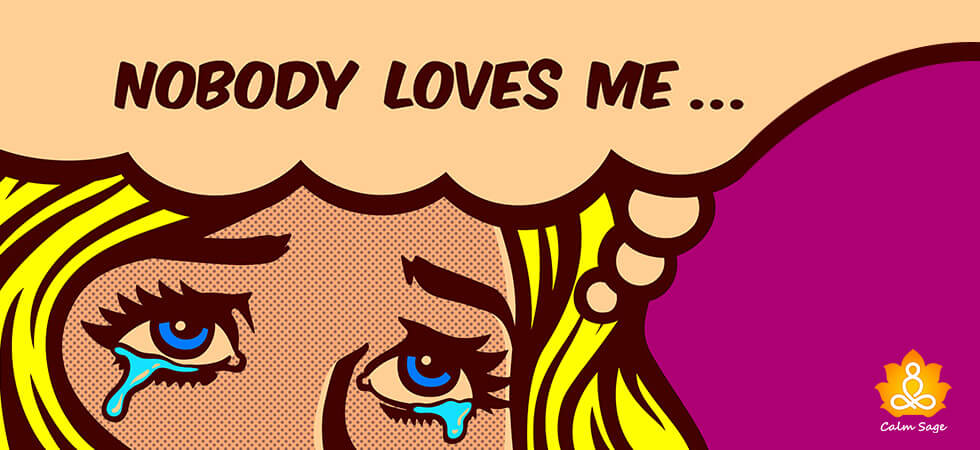Why do I Feel Like Nobody Loves Me?

If you have ever experienced the thought, “I am not loved”? You are not alone. This feeling is encountered by many, especially during challenging times like establishing connections or finding romantic love. Regardless of the situation, it is important to understand that feeling unloved does not mean nobody cares about you.
It means the person you want to love you is not reciprocating in the manner you want. However, managing this sentiment can be challenging, but it can be managed. This guide aims to answer why you feel like no one loves you.
Feeling unloved is a challenging and isolating experience. However, navigating through these feelings is not impossible. You just need to remember you are worthy of love and understanding. Love yourself and never let anyone else’s judgment make you feel you are less in any aspect.
What Does Nobody Love You Mean?
The feeling nobody loves you often stems from a complex interplay of emotions and different life experiences, such as past rejections, difficult relationships, or internal struggles with self-worth. Due to this, people often manifest deep loneliness, sadness, or despair.
Most of the time, this feeling doesn’t necessarily reflect reality but rather signifies a state of emotional distress. Therefore, it’s important to remember that feeling unloved is a shared human experience, and you are not alone. When you understand this, these emotions fade, and you can overcome this situation and embrace the healing path.
The feeling of being unloved arises from different factors. They can be both internal and external. Here we explain some reasons why someone might experience this emotional state:
1. Lack of Emotional Validation:
When a person’s feelings and emotions are consistently dismissed or invalidated, they may feel unloved. This feeling can be experienced in various relationships, like romantic, familial, or even friendships.
2. Inadequate Communication:
Proper communication is the key element in a relationship. When there is no communication or understanding, feelings of disconnect can arise. This happens due to misunderstandings, misinterpretation, poor listening skills, or simply not expressing oneself clearly.
3. Past Trauma or Emotional Wounds:
If you have been rejected or experienced abandonment or betrayal, it can leave lasting scars, making you feel unworthy. These wounds can resurface when you get into a new relationship, leading to unloved feelings, even when circumstances do not indicate such things.
4. Unmet Expectations:
When a person’s expectations of love and affection are unmet, it can lead to disappointment and a sense of being unloved. This might include unfulfilled promises, unmet needs, or a lack of affectionate gestures.
5. Comparisons to Others:
Constantly comparing oneself to others who are in a relationship or appreciated in social circles makes you feel unworthy, inadequate, and unlovable
6. Negative Self-Perception:
When an individual struggles with low self-esteem or a poor self-image, they may have difficulty accepting love from others, even if it is genuinely offered. They always think there is some ulterior motive and doubt them and their feelings.
7. Depression or Anxiety:
If a person is struggling with mental health conditions like depression and anxiety, they can have a distorted perception of reality. They might interpret gestures of love as insincere or inadequate, contributing to feelings of being unloved.
8. Physical or Emotional Distance:
To feel loved, physical and emotional proximity is important. However, when there is physical separation because of long-distance relationships or emotional distance due to busyness or any other reasons, unresolved conflicts are bound to happen, leading to emotional detachment and feeling unloved. If this continues for long, the relationship can create a toxic atmosphere, making it difficult to feel loved or valued.
9. Loss or Grief:
Experiencing a significant loss, such as the death of a loved one, can also trigger feelings of isolation and being unloved. Also, the standard society has set around being loved and the grieving process impacts how individuals perceive and experience love, potentially leading to feelings of inadequacy or unlovability.
Feeling unloved is a deeply personal and subjective experience. Addressing these feelings is important as it is the only way to heal. Self-reflection, open communication, and support are ways you can adapt to healing.
What to Do When You Know Nobody Loves You?
Feeling like nobody loves you is not easy to handle. But you can overcome this feeling by following these tips:
1. Challenge Negative Thoughts:
Negative self-talk is one of the biggest reasons for feeling lonely and unloved. To overcome this, you must practice self-compassion, replace negative thoughts with positive affirmations, and pay attention to your thoughts.
For example, instead of thinking, “Nobody loves me,” consider, “I may be feeling lonely now, but that doesn’t define my worth.
2. Connect with Supportive People:
Reach out to trusted friends, family, or individuals who care about you. Sometimes, we underestimate the love and support already in our lives because of our negative thoughts and what we expect from others. Talk to your friends and family members and share your feelings. Turning to online drug addiction treatment can also help address deeper emotional struggles.
3. Engage in Self-Care:
Take care of your physical, emotional, and mental well-being by taking enough rest, eating well, exercising, and engaging in activities that bring you joy. Do things that bring you joy, whether a hobby, time in nature, or reading a book. Engaging in activities you love will help improve your mood and well-being.
4. Help Others:
Kindness and giving can help you feel more connected to the world and remind you of your value. Take time to acknowledge what you have and what you have achieved, no matter how small they may seem. This can help boost your self-esteem. When you give back to others your focus is shifted from feeling lonely to feeling loved.
5. Set Realistic Expectations:
Understand that feeling loved doesn’t mean grand gestures. It can be found in small moments of connection, support, and understanding. Be thankful for what you have, and write down things that you are thankful for. This will help shift your focus towards the positive aspects of your life.
6. Acknowledge Your Feelings:
Recognize that what you’re feeling is valid. It’s okay to feel lonely or unloved at times. Allow yourself to experience these emotions without judgment. But in doing so never forget to treat yourself with kindness and understanding. Avoid being overly critical of yourself. Practice self-care activities that make you feel good.
7. Seek Professional Help:
If after following these things the feelings of loneliness and unworthiness persist, try to speak with a therapist or counselor. They can provide you with tools and techniques to navigate these emotions. Also, they will help learn ways in which you can have positive social interactions that are meaningful and uplifting.
You Are Worthy of Love:
You are deserving of love and care, just like anyone else. If you feel another way because of some life event or something has happened that you never thought of it is okay. Let yourself feel the feeling and look for ways to rediscover your self-worth. Love yourself when you start to appreciate yourself and your capabilities, what others say will no longer matter.
Seek support, practice self-compassion, and engage in activities that bring you joy. You deserve love and connection, and people care about you. Just look around and appreciate what you have. You will find many people who love you and are always there for you.





















Thankyou for your input written with alot of wisdom, i guess you've experienced this also.